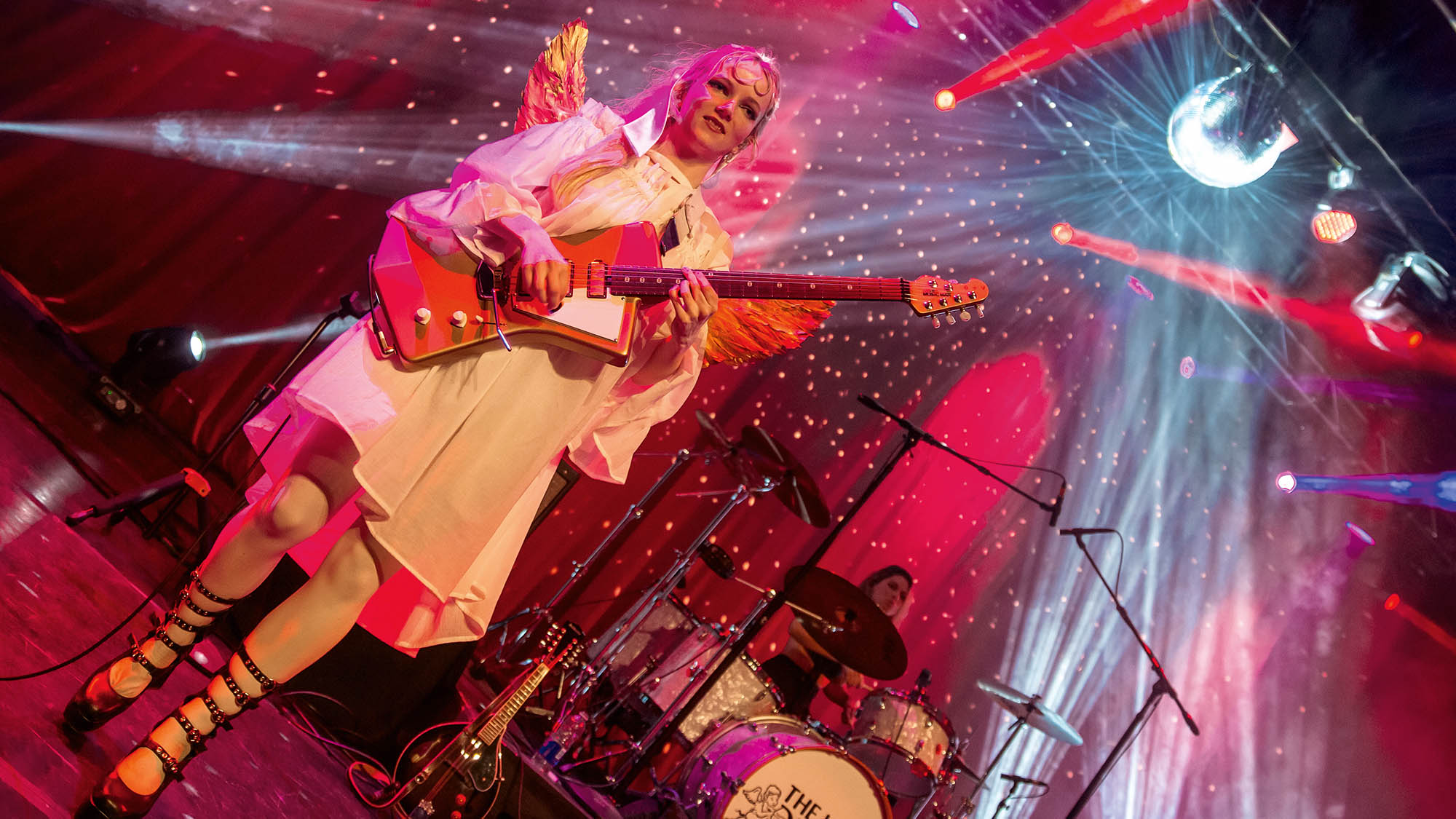“Brian May is my main influence for writing guitar parts. I like how melodic and catchy his playing is. It’s not trying to show off”: The Last Dinner Party’s Emily Roberts on bringing jazz into pop, and how St. Vincent shaped her playing (and her gear)
Her band has the biggest-selling debut album in nearly a decade in her native UK, and secured tours with Hozier and Florence & The Machine. Guitarist Emily Roberts explains how her background in jazz, theater and a Queen tribute band inspired her evocative playing style

The Last Dinner Party have seen a meteoric rise since their debut album, Prelude To Ecstasy, dropped into the UK No 1 album slot earlier this year as the biggest-selling debut in nearly a decade.
Tours with Hozier and Florence & The Machine, along with a BBC Sound of 2024 award, have seen the band hit dreamy highs, a sharp trajectory for guitarist Emily Roberts.
“I did a degree in jazz guitar before going on to work as a session player for a few artists,” she tells us. “It was Covid when I graduated, so once things got more back to normal I started the job on [West End show] Six The Musical, which I quit to join the band.”
Jazz influence
While the band’s richly textured music sits in the mainstream quarter, Emily’s background has proven useful.
“Having all of the jazz theory knowledge gives me a lot of ideas when it comes to writing a rock or pop song,” she acknowledges. “It’s definitely helped having that theory behind it when it comes to improvising ideas and understanding harmony. On the track Sinner, there was a lot of jazz influence in the lead lines, which was interesting. And we all come from different training backgrounds.
“Aurora [Nishevci, keys] is a composer and comes from a classical background, whereas Lizzie [Mayland, guitar and vocals] did art history, and [Georgia Davies, bass, and Abigail Morris, lead vocals] did English literature, so there’s a broad range.”
Best practice
To make sure they were ready for the stage, the band began rehearsing a year before they went public.
Get The Pick Newsletter
All the latest guitar news, interviews, lessons, reviews, deals and more, direct to your inbox!
“Once we had our first gig booked we knew we had to really pull it together,” Emily says. “We’d been rehearsing from 2020 and then had our first show in the George Tavern in London in 2021. Having a year where we couldn’t do any live gigs helped us to think about what we were doing, practise and get it really tight.”
The audience for their first show was modest: “There were only 10 or 20 people. But after that it grew really quickly and we got at least 100 Instagram followers after every gig. It was purely word of mouth because we had no music out then.”
Elevating the song
When debut album, Prelude To Ecstasy, landed at the beginning of the year, rave reviews rolled in, and its bold sound takes on Emily’s formative influences.
“I was in a Queen tribute band,” she tells us. “Even though I only did one gig, I really got inside Brian May’s playing and I would say he’s my main influence for writing guitar parts and coming up with ideas.
“I really like how melodic and catchy his playing can be. It’s not necessarily trying to show off; it’s more what can be good in a moment of the song and what can lift it. It’s how I approached the Nothing Matters guitar solo – I needed something to elevate the song and be as strong as the rest of it.”
Melody matters
This discerning approach to playing encapsulates Emily’s style and she is aware of what she considers her role in a band.
“I’ve never had the mentality where I have to show off every lick I’ve learned and put it in a solo,” she says. “I prefer stuff that you can sing, basically. I want to show people what I can do, but it’s important to balance it and serve the song.
“I also write things that challenge me. Sinner was influenced by St Vincent because she doesn’t play licks as such, or things I’ve heard before. It’s very much her own thing and she’s not afraid to be creative with it, which is ultimately what I want to do.”
Good as Goldie
Perhaps unsurprisingly considering how much Emily admires St. Vincent, her current instrument of choice is the Ernie Ball Music Man St. Vincent Goldie signature guitar.
“I started out gigging on a Music Man Mariposa. I thought it was unique-looking and quite affordable, but I had my eye on the St. Vincent one and saved up to get it. It’s now my main guitar.
“It’s iconic-looking and quite trebly and really sticks out. I’m only 5ft 2in as well, and some guitars give me backache, but this one fits really well. There aren’t many guitars designed by women, so it was kind of a no-brainer.”
- Prelude to Ecstasy is out now via Island Records.
Glenn Kimpton is a freelance writer based in the west of England. His interest in English folk music came through players like Chris Wood and Martin Carthy, who also steered him towards alternate guitar tunings. From there, the solo acoustic instrumental genre, sometimes called American Primitive, became more important, with guitarists like Jack Rose, Glenn Jones and Robbie Basho eventually giving way to more contemporary players like William Tyler and Nick Jonah Davis. Most recently, Glenn has focused on a more improvised and experimental side to solo acoustic playing, both through his writing and his own music, with players like Bill Orcutt and Tashi Dorji being particularly significant.
“We hadn’t really rehearsed. As we were walking to the stage, he said, ‘Hang on, boys!’ And he went in the corner and vomited”: Assembled on 24 hours' notice, this John Lennon-led, motley crew supergroup marked the beginning of the end of the Beatles
“I pushed myself to down-pick faster and make the riffs more aggressive. Maybe it’s the old man in me struggling to feel young and fighting back against aging”: How Killswitch Engage went to thrash metal bootcamp to deliver their face-ripping return














